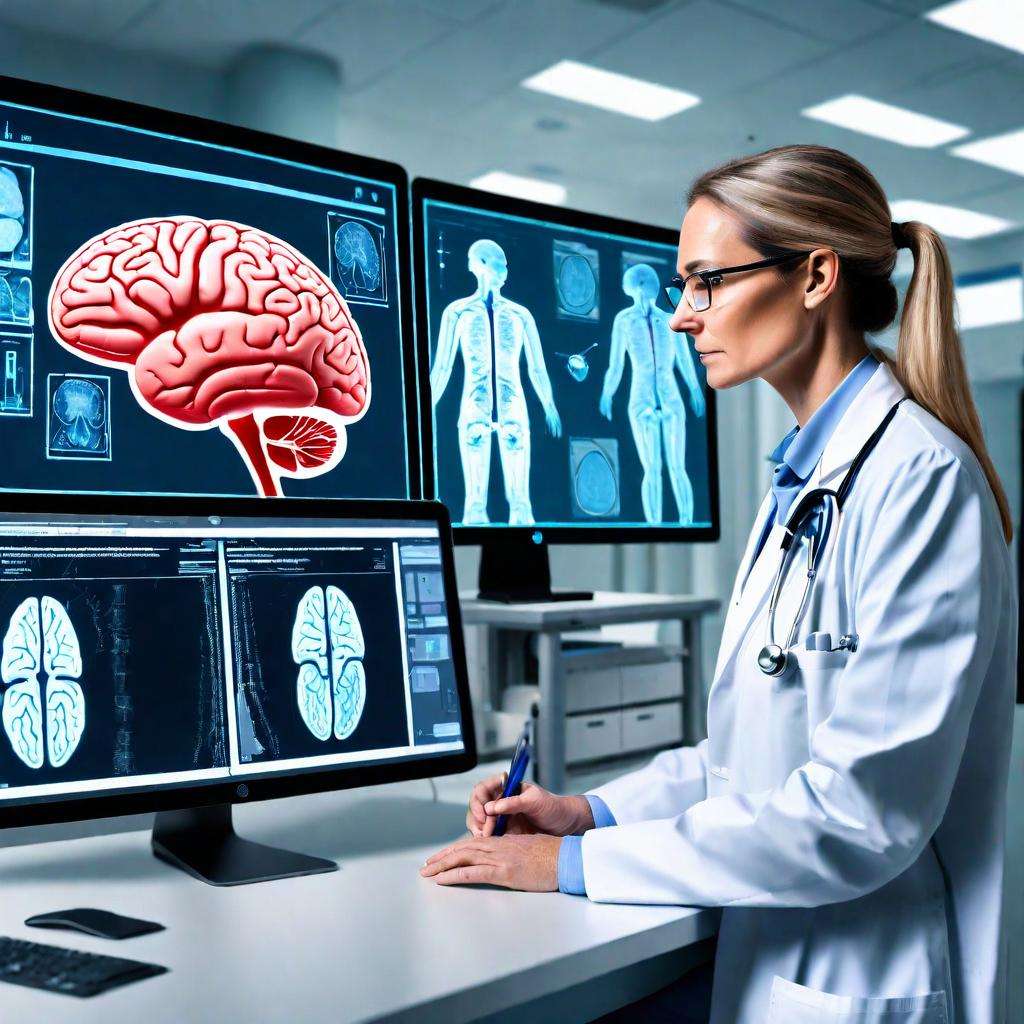Artificial Intelligence (AI) is transforming various sectors, and healthcare is one of the most significant beneficiaries of this technological revolution. From early diagnosis to personalized treatment, AI is enhancing the quality of care and making healthcare more efficient. In this article, we’ll explore how AI is being integrated into healthcare, its benefits, challenges, and future prospects.
Introduction to AI in Healthcare
Artificial Intelligence refers to the simulation of human intelligence processes by machines, especially computer systems. In healthcare, AI is used to analyze complex medical data, aiding in diagnostics, treatment planning, and patient care. The integration of AI in healthcare promises to reduce costs, improve patient outcomes, and make healthcare accessible to more people.
Key Applications of AI in Healthcare

1. Diagnostic Accuracy
AI algorithms can analyze medical images with remarkable precision. For instance, AI systems are now being used to detect abnormalities in X-rays, MRIs, and CT scans. These systems can identify patterns that might be missed by human eyes, leading to earlier and more accurate diagnoses. For example, Google’s DeepMind has developed an AI that can diagnose eye diseases as accurately as world-leading ophthalmologists.
2. Personalized Treatment Plans
AI helps in creating personalized treatment plans based on individual patient data. By analyzing genetic information, lifestyle, and other health records, AI can suggest the most effective treatment options. This personalized approach ensures that patients receive treatments tailored to their specific needs, improving the likelihood of successful outcomes.
3. Predictive Analytics
Predictive analytics powered by AI can forecast patient outcomes based on historical data. Hospitals use these predictions to identify high-risk patients and intervene early, potentially saving lives. For instance, AI models can predict which patients are at risk of developing complications, enabling proactive measures to prevent them.
4. Virtual Health Assistants
AI-powered virtual health assistants provide round-the-clock support to patients. These assistants can answer health-related questions, remind patients to take their medications, and even monitor their health conditions through wearable devices. This constant support helps in managing chronic diseases more effectively.
5. Robotic Surgery
Robotic surgery, guided by AI, allows for more precise and minimally invasive procedures. These robots can perform complex surgeries with greater accuracy than human hands, reducing the risk of complications and speeding up recovery times. The da Vinci Surgical System is a prime example of AI in robotic surgery, offering enhanced precision and control during operations.
Benefits of AI in Healthcare
1. Improved Accuracy and Efficiency
AI enhances the accuracy of diagnostics and treatment plans, reducing the margin for error. This precision leads to better patient outcomes and more efficient healthcare delivery.
2. Cost Reduction
By automating routine tasks and improving diagnostic accuracy, AI helps reduce the overall cost of healthcare. Early diagnosis and personalized treatment plans prevent expensive and prolonged treatments.
3. Increased Accessibility
AI makes healthcare more accessible, especially in remote and underserved areas. Telemedicine platforms, powered by AI, allow patients to consult with doctors from the comfort of their homes, breaking down geographical barriers.
4. Enhanced Patient Experience
AI improves patient experience by providing continuous support and personalized care. Virtual health assistants and remote monitoring tools ensure patients receive timely assistance and interventions.
Challenges of AI in Healthcare
1. Data Privacy and Security
The use of AI in healthcare requires access to vast amounts of personal data. Ensuring the privacy and security of this data is a significant challenge. Healthcare providers must comply with strict regulations to protect patient information from breaches. The World Health Organization (WHO) emphasizes the importance of data security and ethical standards in AI applications.
2. Integration with Existing Systems
Integrating AI with existing healthcare systems can be complex and costly. Many healthcare facilities use outdated technology, making it difficult to implement advanced AI solutions seamlessly.
3. Ethical and Legal Issues
AI in healthcare raises ethical and legal questions, such as accountability for AI-driven decisions and the potential for bias in AI algorithms. These issues need to be addressed to build trust and ensure fair use of AI.
4. Training and Adoption
Healthcare professionals need to be trained to work with AI technologies. Resistance to change and lack of training can hinder the adoption of AI in healthcare settings.
Future of AI in Healthcare
The future of AI in healthcare looks promising. Continuous advancements in AI technology will lead to more sophisticated applications, further improving patient care and outcomes. Here are some trends to watch:
1. Advanced Predictive Analytics
AI will continue to enhance predictive analytics, allowing for even earlier intervention and better management of chronic diseases. These advancements will lead to a more proactive healthcare system, focusing on prevention rather than treatment.
2. Integration with Genomics
AI’s integration with genomics will revolutionize personalized medicine. By analyzing genetic information, AI can predict susceptibility to diseases and tailor preventive measures accordingly.
3. AI in Drug Development
AI will play a crucial role in drug discovery and development. By analyzing vast datasets, AI can identify potential drug candidates faster and more accurately than traditional methods, speeding up the process of bringing new treatments to market.
4. Telehealth Expansion
The COVID-19 pandemic accelerated the adoption of telehealth, and AI will continue to enhance these services. AI-powered telehealth platforms will offer more sophisticated diagnostic and treatment options remotely, making healthcare more accessible to everyone.
Conclusion
Artificial Intelligence is revolutionizing healthcare, offering unprecedented opportunities to improve patient care and operational efficiency. While there are challenges to overcome, the benefits of AI in healthcare are undeniable. As technology advances, AI will become an integral part of healthcare, making it more accurate, efficient, and accessible. For more information on the advancements and regulations in AI healthcare, visit the National Institutes of Health (NIH).

